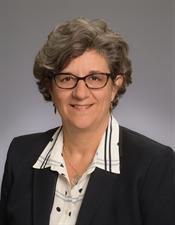Inaugural Wilmot Distinguished Professor, Director of Translational Research to Join Wilmot Cancer Institute

Paula M. Vertino, Ph.D., will join the University of Rochester Medical Center and Wilmot Cancer Institute as the Director of Translational Research and professor of Biomedical Genetics this summer. Her appointment is pending approval by the University's Board of Trustees. Vertino will also serve as the Wilmot Distinguished Professor, an endowed position funded by the family of James P. Wilmot, the cancer institute’s namesake. She will be a member of the institute’s executive committee and Hallmarks of Cancer research program, which focuses on the biology of cancer.
“I see a lot of great opportunities in Rochester to interact with faculty doing foundational research, to bring it from concept to application for new treatments or diagnostic advances,” Vertino said. “It’s a very collaborative environment, all on one campus, and a really great base to build from.”
Originally from the Buffalo area, Vertino pursued graduate work at Roswell Park Comprehensive Cancer Center and received her doctorate from the State University of New York at Buffalo. She completed her postdoctoral training in cancer genetics at Johns Hopkins Oncology Center. Since 1996, Vertino has been on the faculty at Emory University, where she has served as a professor in Radiation Oncology and led the Cancer Genetics and Epigenetics Program at Winship Cancer Institute. She directed graduate studies for the Cancer Biology Graduate program and served as co-director for research for the Hematology and Medical Oncology Fellowship Program. Vertino also has served as a regular member on the Cancer Etiology study section at the National Institutes of Health, and she is currently a member of the NCI-A parent committee that oversees the review of National Cancer Institute designated cancer centers nationwide.
As Wilmot’s Director of Translational Research, Vertino will be responsible for facilitating interaction among scientists and clinicians with the goal of accelerating the development of laboratory discoveries into technologies or treatments for use with patients.
“I look forward to bringing people together to work on common themes and promoting more team science,” Vertino said. “That is how we’ll bring concepts from the bench to the bedside and back again.”
Vertino’s research focuses on epigenetics and how aberrant gene expression leads to cancer. Her work also seeks to understand how these changes in gene expression could serve as therapeutic targets. Over her career, Vertino has had more than 70 peer-reviewed scientific publications and more than 20 years of continuous, overlapping cancer-relevant funding. Vertino’s lab will be located at the Wilmot Cancer Center, which was designed to encourage collaboration between scientists and clinicians.
“Paula’s research on cancer epigenetics will greatly expand our areas of research strengths at Wilmot Cancer Institute from molecules to human populations,” said Hucky Land, Ph.D., Wilmot’s co-director and director of research. “She is an exceptionally important player in her field. We are absolutely delighted that she will be joining our leadership team and are very much looking forward to working and collaborating with her.”
As a member of the cancer center’s executive committee, Vertino will be able to share her experience at Emory, which recently received NCI comprehensive cancer center status, to assist in Wilmot’s pursuit of NCI designation.
“I am so excited to welcome Paula to our faculty and the executive committee of Wilmot,” said Jonathan W. Friedberg, M.D., M.M.Sc., director of Wilmot Cancer Institute. “Her experience at Emory running a large research program recently helped lead that institution to comprehensive cancer center designation by the NCI. She is a most deserving inaugural recipient of the Wilmot Distinguished Professorship given her international reputation in epigenetic research. Her deep knowledge of cancer centers will be invaluable to our aspirations toward NCI designation.”
###
UR Medicine’s Wilmot Cancer Institute is the Finger Lakes region’s leader for cancer care and research. As a component of Strong Memorial Hospital, Wilmot Cancer Institute provides specialty cancer care services at the University of Rochester Medical Center and a network of locations throughout the region. The Institute also includes a team of 100 scientists who investigate many aspects of cancer, with an emphasis on how best to provide precision cancer care. To learn more, visit wilmot.urmc.edu.
The University of Rochester Medical Center is home to approximately 3,000 individuals who conduct research on everything from cancer and heart disease to Parkinson’s and pandemic influenza. Spread across many centers, institutes, and labs, our scientists have developed therapies that have improved human health locally, in the region, and across the globe. To learn more, visit urmc.rochester.edu/research.


